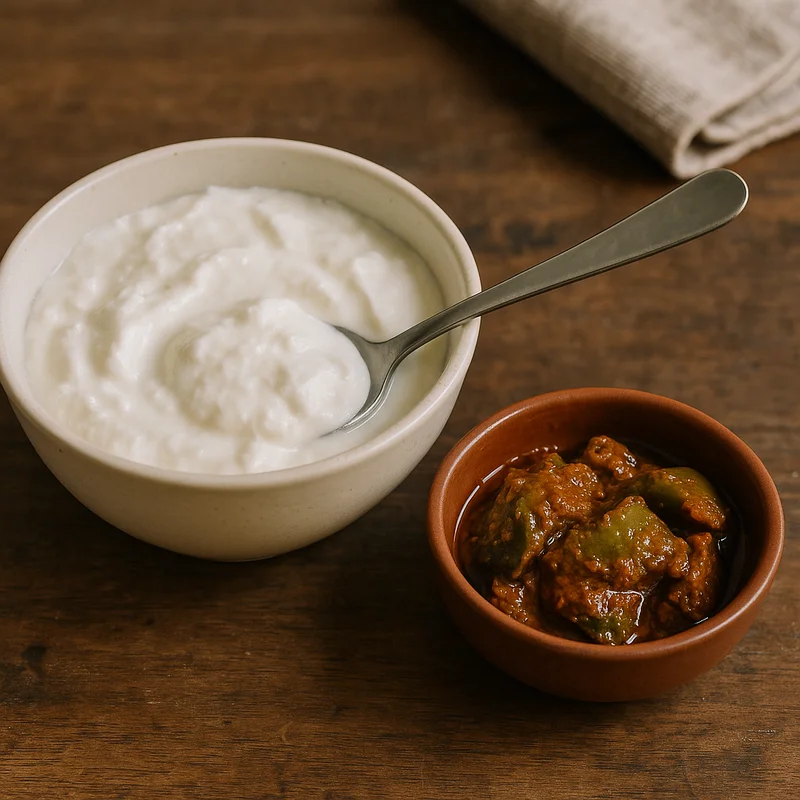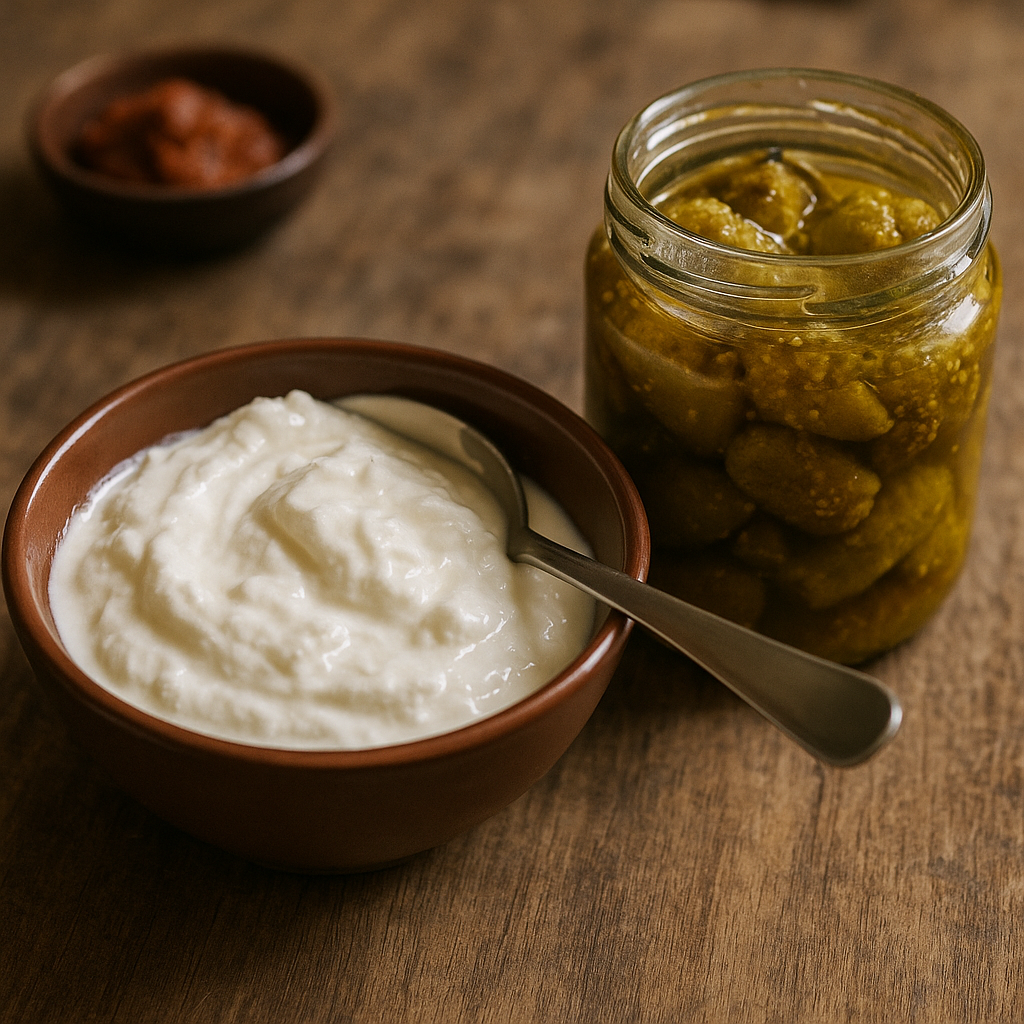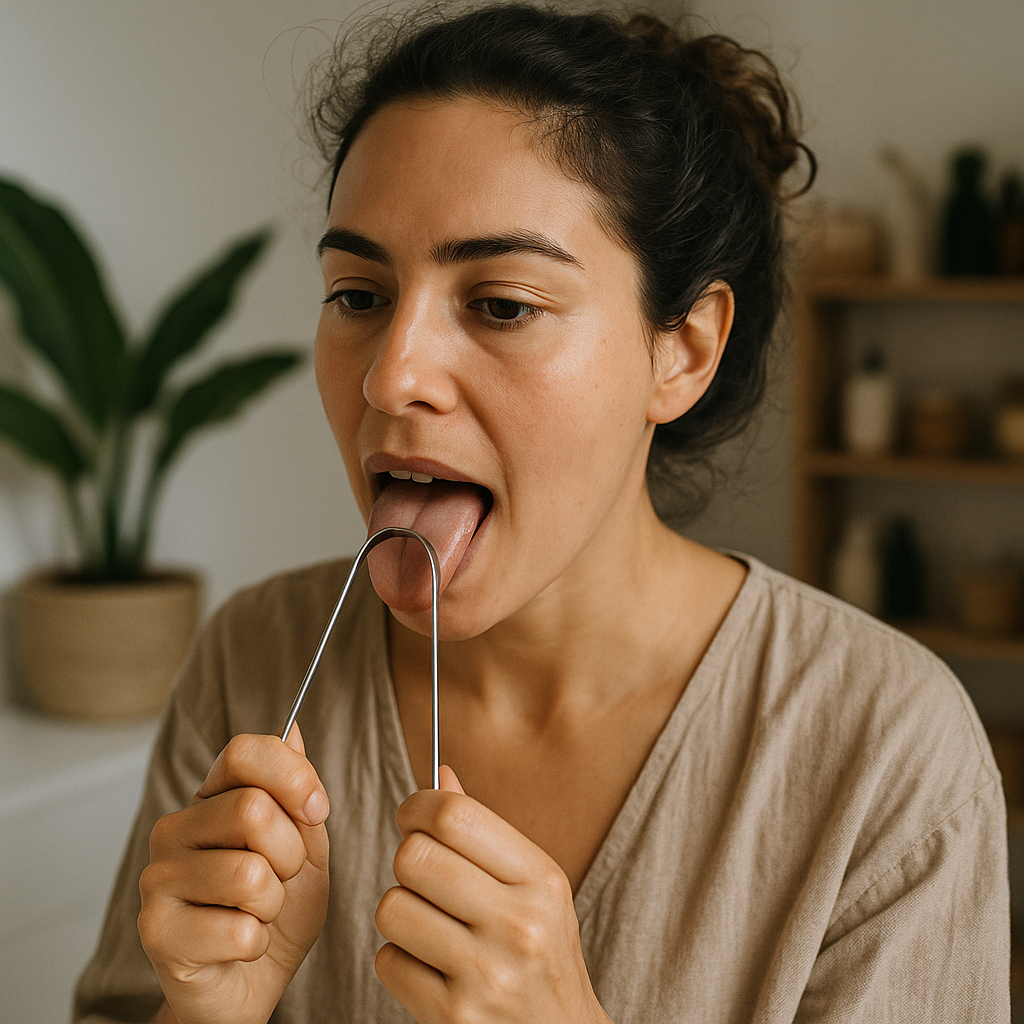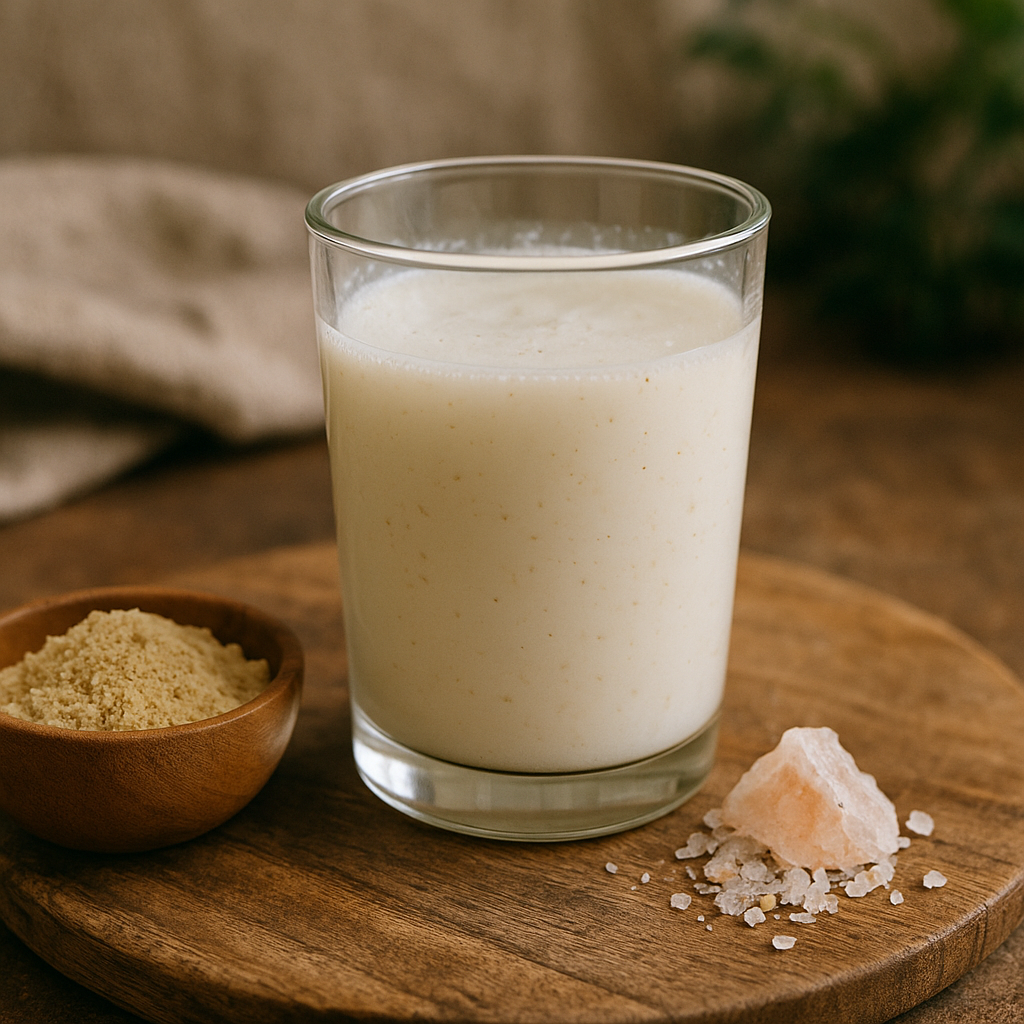Can We Eat Curd and Pickle Together?

Introduction: Can We Eat Curd and Pickle Together? A Deep Dive into Ayurveda’s Take
You know what’s weird? Some combinations that taste great together might not actually sit well with your body. Like, curd and pickle — such a common combo on Indian plates. Especially in the summer. You’ve probably had it. I have too. But is it... Ayurvedically okay?
Now, if you're reading this, you’re either confused, concerned, or just curious — which is fair. We hear mixed things: some say curd is cooling, pickle is heating; others say together they’re fine unless your doshas are all messed up. It’s confusing.
But here's the thing: Ayurveda doesn't look at food in isolation. It’s not just about what you eat — it’s how, when, why, and who is eating it.
Why Should You Even Care What Ayurveda Thinks?
Well, for starters, Ayurveda isn’t a fad. It’s over 5,000 years old — tried, tested, and still surprisingly practical in today’s world. More importantly, it doesn’t just dish out generic advice. It’s personalized. It looks at your constitution (prakriti), your imbalances (vikriti), the season, your digestion (agni), your habits — everything.
So when Ayurveda says something like “curd and pickle don’t go well together,” it’s not because ancient sages didn’t like tangy stuff. It’s because they noticed how certain combinations created ama (toxins), or messed with digestion, or flared up pitta, or just made people feel gross.
So What Do You Get From This Article?
By the end of this (admittedly long but hopefully enjoyable) read, you’ll:
-
Understand why curd and pickle might not be a great combo for you — or maybe they are.
-
Learn how Ayurveda evaluates food pairings and what principles actually matter.
-
Get super actionable tips to align your meals with your body’s needs.
-
Possibly re-think some daily food habits that seemed harmless.
And no, this isn’t going to be a preachy “don’t eat this, don’t eat that” kind of thing. We’re talking real-world practicality — because let’s face it, life’s too short to obsess over every bite.

Understanding the Role of Ayurveda in Managing the Question: Can We Eat Curd and Pickle Together?
Let’s unpack this without getting lost in Sanskrit (okay, maybe a little Sanskrit).
### What Ayurveda Says About “Can We Eat Curd and Pickle Together?”
So here’s the short version: Ayurveda usually recommends not combining sour or fermented foods like pickles with curd (which is already sour and heavy). Why?
-
Curd is considered heavy, sour, heating — and it can aggravate Kapha and Pitta, especially when eaten at the wrong time (like at night).
-
Pickles, depending on their ingredients, are often very sour, salty, and oily — which makes them even more heating and pitta-provoking.
Now put the two together, and what do you get? Potential digestive overload. They both stimulate agni (digestive fire), but not always in a good way. Too much fire can burn out the system, metaphorically speaking — leading to acidity, skin issues, irritability, and imbalances in the gut.
But — and here’s the twist — context matters.
If you’re eating this combo:
-
In small quantities
-
In the afternoon (when digestion is strongest)
-
With a balancing meal (say, plain rice or bland dal)
-
And you have a strong agni (digestion) and balanced doshas
…it might not be the worst thing. Ayurveda doesn’t like extremes. It’s all about balance.
### How Ayurvedic Lifestyle & Diet Directly Impact This Combo
What you eat is just one piece. Ayurveda would ask:
-
Are you stressed while eating?
-
Did you heat your curd (bad idea)?
-
Are you combining it with fried food, spicy sabzis, or other sour things like tomatoes?
-
Did you eat it at night?
Because if you're layering sour upon sour upon sour (pickles, curd, spicy chutney, tomato-heavy curry), your gut’s not going to be thrilled. You’ll probably feel bloated or even a little angry — literally. Pitta imbalance often shows up as irritability.
A calm, mindful meal in the afternoon with just a spoon of homemade pickle and a spoon of fresh curd — probably fine.
A midnight fridge raid with cold leftover curd rice and some mango pickle? Not so much.
### The Importance of Individualized Ayurvedic Approaches
And now for the real kicker: there’s no one-size-fits-all. Ayurveda always circles back to you — your dosha, your state of balance, your lifestyle.
For example:
-
A Kapha-dominant person (prone to sluggish digestion, congestion, heaviness) might want to avoid curd altogether — especially with pickle.
-
A Pitta-dominant person could get inflamed or irritated by this combo.
-
A Vata-dominant person might benefit from a bit of curd for grounding, but only when it's spiced and warm. Add pickle? Might cause bloating or dryness, depending on the type.
Ayurveda treats you like a dynamic, ever-changing being. So that same curd-pickle combo might suit you one day and totally mess you up the next.
Ayurvedic Dietary Guidelines for “Can We Eat Curd and Pickle Together”
Okay, now let’s get into the food talk. The what-to-eat, what-to-run-from, and how-to-pair things kind of details. This is where Ayurveda starts getting real.
### Foods Recommended by Ayurveda for This Situation
If you’re someone who loves curd and pickle together (and hey, many of us do), Ayurveda won’t necessarily scream “never!” but it does whisper: "Be wise, my friend."
Here’s what it actually encourages:
-
Spiced curd — Curd with roasted cumin, a pinch of black salt, maybe some fresh coriander. This makes it lighter, easier to digest. Honestly, plain curd is just too dense.
-
Homemade, naturally fermented pickles — Not the preservative-loaded stuff from plastic jars. Think: lemon pickle in sesame oil, aged properly. That stuff’s a digestive friend when used wisely.
-
Balancing base foods — Like warm rice, lightly spiced khichdi, or plain rotis. These create a neutral platform that offsets the sourness.
And importantly: moderation. In Ayurveda, quantity is everything. Even something a little unsuitable can be tolerated if you have just a touch of it, and your body’s strong.
### Foods Ayurveda Suggests Avoiding for Curd + Pickle Scenarios
Let’s get brutal for a second. These combos are a no-no:
-
Curd with fish
-
Curd with meat
-
Curd at night
-
Curd with sour fruits or tomatoes
-
Cold curd straight from the fridge
If you’re also adding pickle to the mix? Double whammy.
And a side rant: why are we so obsessed with refrigerator-cold curd in this country? Room temperature or slightly warmed (not cooked!) curd is so much easier on your system. Cold curd just kills your agni.
### Meal Planning and Timing Tips in Ayurveda for This Combo
Here’s where it gets practical:
-
Best time to eat curd (with or without pickle): Lunchtime. Period. That’s when your digestive fire is strongest.
-
Avoid combining with other sour things. Like tamarind-heavy sambars or tangy chaats. It’s just too much acidity.
-
Space out your meals. Don’t go from yogurt-pickle lunch to sweet lassi to milk tea to fermented idli-dosa dinner. Give your system space to digest.
I like to think of it like music. If every instrument plays loudly at once, it’s chaos. But if you stagger and blend — curd here, pickle there — it can be a beautiful melody.
### Hydration and Beverage Recommendations
Big one here, and often ignored.
-
Avoid cold water with curd and pickle. Honestly, avoid it always.
-
Sip warm water or cumin tea with or after the meal. It helps digestion, reduces heaviness, and pacifies Kapha.
-
Want to get fancy? Try ajwain water or fennel infusion post-meal.
Remember: Ayurveda isn’t about guilt-tripping you into eating boiled spinach. It’s about intelligent choices that work with your body, not against it.

Ayurvedic Lifestyle Practices Specifically Beneficial for “Can We Eat Curd and Pickle Together?”
What you eat is only half the battle. The other half? How you live.
### Daily Ayurvedic Routines (Dinacharya) to Balance Out This Combo
Here are a few small habits that make a big difference if you must keep eating curd and pickle:
-
Tongue scraping every morning — Helps assess your digestion and clear out toxins.
-
Warm water first thing — Keeps your gut clean and moving.
-
Self-massage (Abhyanga) — Helps move lymph, support digestion indirectly.
These sound simple — and they are. But they support your digestive fire and detox pathways so your system doesn’t freak out when you throw in the odd curd-pickle pairing.
### Sleep Patterns and Ayurvedic Guidelines
One word: early.
-
Try to sleep by 10 p.m., which aligns with natural pitta detox time.
-
Late-night curd and pickle binge + scrolling + sleeping at 1 a.m.? Disaster for digestion and skin.
And if you're waking up bloated or heavy, Ayurveda would probably look at your evening meals and say: “I told you so.”
### Ayurvedic Personal Care Practices That Help
Yes, what you rub on your skin matters too:
-
Triphala at night — for gut cleansing.
-
Nasya (oil in the nose) — balances pitta in the head area (often aggravated by too much sour food).
-
Cooling oils like Brahmi or coconut on the scalp — especially helpful if you notice pitta signs like acne, anger, or hair thinning.
These don’t seem related to curd and pickle, but they are. Because Ayurveda sees your whole system as connected.
Yoga & Breathing Techniques for “Can We Eat Curd and Pickle Together?”
Surprised? There’s actually a link. Because if this food combo affects digestion and heat in the body — then guess what?
Yoga and pranayama can help balance that.
### Yoga Asanas Specifically Recommended
Focus on:
-
Twists (like Ardha Matsyendrasana) — stimulate digestion
-
Forward bends (like Paschimottanasana) — calm pitta and support elimination
-
Gentle flows — Surya Namaskar, but slowly. Not the gym version.
Avoid high-heat, aggressive practices if you're feeling acidic or inflamed.
### Pranayama (Breathing Exercises) That Help
Your new best friends:
-
Sheetali & Sheetkari — cooling breaths that balance pitta.
-
Nadi Shodhana (alternate nostril) — always a win. Balances all doshas.
-
Bhramari — great for emotional calm, which sour-heavy diets can sometimes disrupt.
Again: notice the theme? Calm, balance, digestion, gentleness.
### How Often Should You Practice?
Honestly? Daily.
But even 10 minutes post-lunch of gentle walking, followed by 5 minutes of pranayama can work wonders.
Consistency > Intensity.
Stress Management and Emotional Health Advice for “Can We Eat Curd and Pickle Together?”
Yes, this is relevant.
If you’re eating emotionally — stress eating, eating while angry or sad — curd and pickle can act like a matchstick on dry hay. Boom. Inflammation. Bloating. Mood swings.
### Ayurvedic Techniques to Reduce Stress Related to This Combo
-
Shirodhara (oil stream on forehead) — if you have access, it’s a game changer.
-
Warm oil massage — even a 10-minute foot massage at night.
-
Aromatic herbs — like Brahmi, Ashwagandha, Jatamansi. Not necessarily food, but affect digestion indirectly via the mind.
### Meditation and Mindfulness Practices
-
Trataka (candle gazing) — builds focus, reduces emotional binge eating.
-
Guided body scans or yoga nidra — help prevent impulsive food combos (yes, it happens).
Sometimes, we reach for curd and pickle not because we’re hungry — but because we’re wired or bored or anxious.
### Emotional and Psychological Considerations
Ayurveda sees sour taste as:
-
Stimulating
-
Sharp
-
Aggressive
If you’re in a pitta-aggravated emotional state (anger, judgment, control), sour food fuels it.
So curd and pickle aren’t just about digestion — they’re about emotional digestion, too.

Practical Ayurvedic Home Remedies and Recipes for “Can We Eat Curd and Pickle Together”
Now we’re getting to the hands-on stuff. The “okay, but what do I do if I already ate curd and pickle together and now my stomach’s a war zone?” kind of stuff.
Or maybe you’re looking for ways to soften the impact when you do indulge. Let’s go.
### Simple and Effective Home Remedies
-
Jeera-Ajwain Tea
-
Dry roast a tsp each of cumin and carom seeds, boil in water, and sip warm.
-
Great after a curd-pickle-rich meal to settle gas and improve digestion.
-
-
Buttermilk with Hing and Rock Salt
-
Skip plain curd. Go for thin buttermilk with a pinch of hing, roasted cumin, and rock salt.
-
This version is “curd-lite” and easier to digest.
-
-
Triphala at Bedtime
-
1 tsp with warm water before bed helps detox and balance doshas.
-
Especially helpful after heavy or sour food intake.
-
-
Licorice (Mulethi) Tea
-
Calms the gut and pacifies Pitta. Works wonders if you feel acidity or burning post meal.
-
Honestly, I keep ajwain tea and Triphala powder in my kitchen like emergency tools. They’re digestive fire-fighters.
### Ayurvedic Recipe Ideas Specifically Beneficial
Instead of completely cutting out curd and pickle, try curating them differently:
-
Spiced Curd Rice (but warm, not cold!)
Add grated ginger, curry leaves, and mustard seeds. Avoid eating straight from the fridge. -
Fresh Lime Pickle in Sesame Oil
A tiny amount with bland khichdi can aid digestion — it's about balance. -
Raita with Mint and Roasted Cumin
This is a better alternative to straight curd + pickle. It’s light and cooling but not overly sour.
### Preparation Tips
-
Always use fresh curd, not old or fermented overnight.
-
Never eat curd cold, especially not with spicy pickle.
-
Avoid using aluminum or plastic containers for storing curd or pickle.
-
Pair curd or pickle with simple, grounding meals — like rice or millets. Not with chole-bhature, okay?
Common Mistakes & Misconceptions About Ayurvedic Lifestyle for “Can We Eat Curd and Pickle Together?”
We all get it wrong sometimes. Here’s a no-shame list of what most of us mess up.
### Common Myths
-
“Ayurveda bans curd and pickle.”
Nope. It’s about how and when. Not a blanket ban. -
“If it’s homemade, it’s automatically Ayurvedic.”
Not necessarily. Even homemade curd, if eaten wrong, can be problematic. -
“Curd is cooling and pickle is spicy, so they balance each other.”
That’s way too simplistic for Ayurveda. It’s not a food tug-of-war.
### Typical Mistakes
-
Eating both at dinner, when digestion is weakest
-
Eating both in large quantities (you only need a spoon of each, max)
-
Combining them with other sour or fried foods
-
Mindless eating — while watching TV, scrolling, arguing — messes with digestion big time
### How to Avoid These
-
Stick to lunch time if you're going to eat this combo
-
Always balance with bland, grounding foods
-
Watch your body’s response — bloating, irritability, acidity = red flags
-
Don’t eat it just because you saw your grandma do it. (No shade — she probably had a stronger digestive fire.)
Real-Life Success Stories & Testimonials
Let’s get real. Not everyone listens to Ayurveda and suddenly becomes a glowing yogi. But small tweaks? They do help.
### Real People, Real Shifts
Shalini, 34, Pune:
“I used to eat curd and mango pickle with everything. Constant acidity, weird breakouts on my face. Switched to spiced buttermilk and only have pickle once a day. Skin cleared in two weeks.”
Rajiv, 42, Bangalore:
“Didn’t believe Ayurveda stuff. But stopped eating curd at night. My sinus issues literally disappeared in a month. I still eat pickle, but now with plain khichdi instead of spicy curries.”
Not magic. Just better food logic.
### What They Noticed
-
Less bloating
-
Improved skin
-
Better sleep
-
Less “food regret” after meals
Tiny shifts. Big impact.
Scientific Evidence Supporting Ayurvedic Lifestyle & Diet for “Can We Eat Curd and Pickle Together?”
Look, you don’t need Ayurveda to believe. But it helps when science backs it up.
### Research Findings About Diet’s Impact
-
A study published in Journal of Clinical Gastroenterology found that food combinations affect gut flora significantly — especially fermented and salty foods.
-
Another paper in Ayurveda Journal of Health confirmed that improper combinations (called viruddha ahara) can lead to inflammation and metabolic disturbances.
### Clinical Studies on Ayurveda’s Benefits
-
Clinical trials in India have shown that Triphala, buttermilk, and cumin water improve digestion and gut microbiome balance.
-
Controlled studies on dinacharya (daily routine) practices showed positive effects on metabolism and digestive health.
### Expert Opinions
Dr. Vasant Lad once said: “The tongue might enjoy something, but the gut doesn’t always agree. Ayurveda asks you to listen deeper.”
Modern integrative medicine experts are now looking at Ayurvedic combo-rules not as superstition but as early gut health science.
Conclusion: So… Can We Eat Curd and Pickle Together or Not?
Here’s where we land: It depends.
If your digestion is strong, your meal is balanced, and it’s lunchtime — a small serving of curd and pickle probably won’t hurt. Might even help digestion.
But eaten at the wrong time, in the wrong way, or by the wrong constitution — it could spell trouble.
Summary of Key Takeaways:
-
Ayurveda doesn’t demonize food — it personalizes it.
-
Curd and pickle are both sour, heating, and potentially aggravating.
-
Lunch > dinner. Warm > cold. Spiced > plain. Moderation > indulgence.
-
Your body knows best — listen.
If you’re serious about aligning your food with your body’s needs, consider consulting an Ayurvedic practitioner who can look at your specific constitution.
Final Thought:
Food isn’t just nutrition. It’s energy, memory, digestion, mood, emotion, and immunity. So even that tiny spoon of pickle — it matters.
FAQs About “Can We Eat Curd and Pickle Together?”
1. Is it okay to eat curd and pickle together daily?
Not recommended. Even if you’re healthy, it’s better to alternate or limit frequency. Try every other day.
2. Can I eat curd and pickle if I have acidity?
Nope. Both are sour and may aggravate Pitta. Switch to buttermilk with cumin instead.
3. What’s the best time to eat curd and pickle?
Lunch, always. Avoid at night or on an empty stomach.
4. Can I replace curd with yogurt from the store?
Store-bought yogurt is often too sour and processed. Fresh, homemade curd is always better.
5. I’ve been eating this combo for years. Why worry now?
If your digestion is strong, fine. But if you’re seeing signs like bloating, acne, acidity — it might be time to rethink.
Got any more questions?
Ask Ayurvedic doctor a question and get a consultation online on the problem of your concern in a free or paid mode.
More than 2,000 experienced doctors work and wait for your questions on our site and help users to solve their health problems every day.

